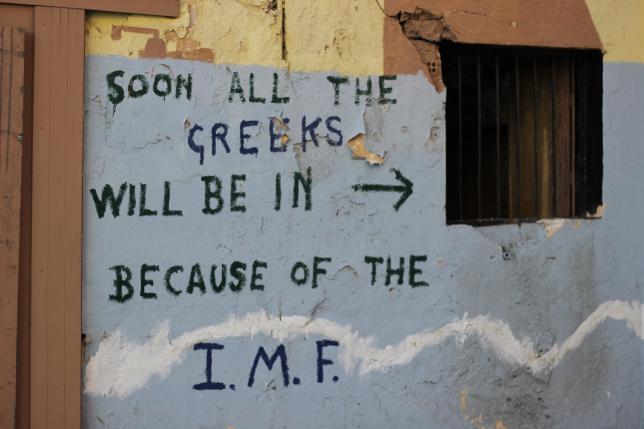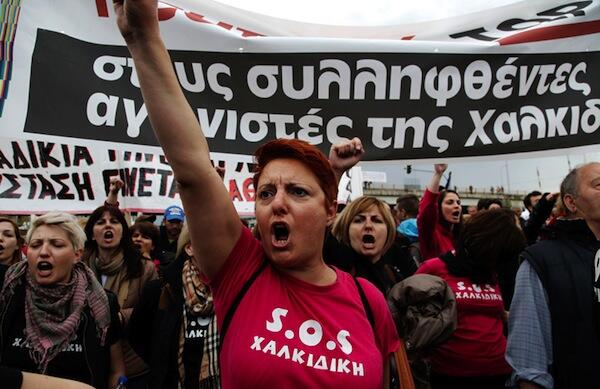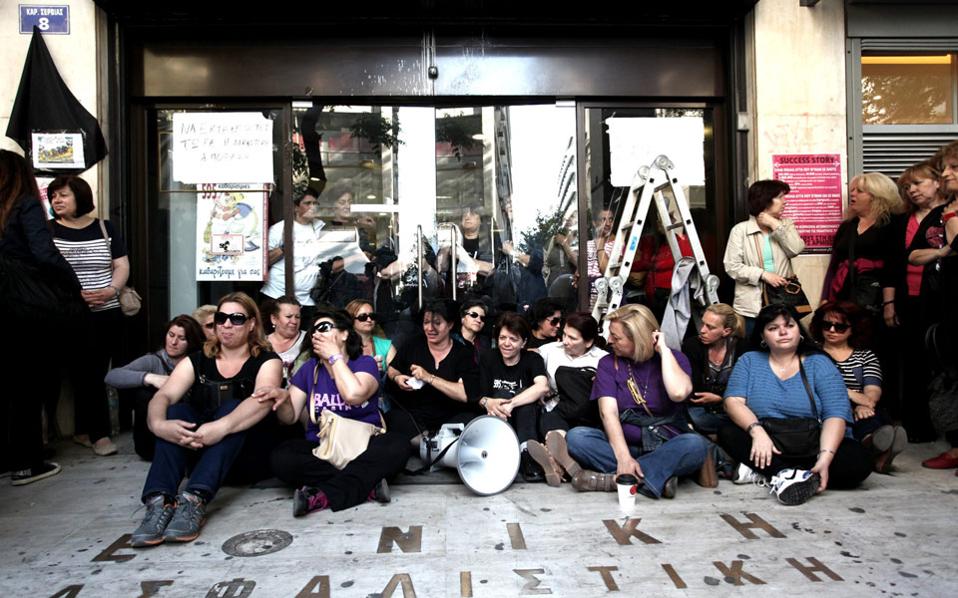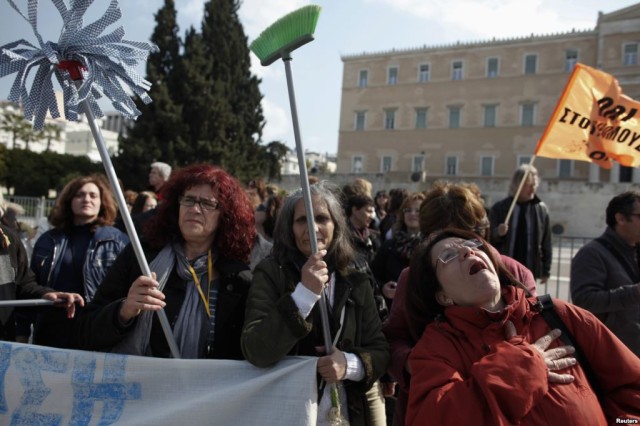
In March the European Forum for Alternatives met. With austerity measures imposed over the populations of Europe under the fabricated argument of the need to repay a fictitious public debt, the solidarity among Europeans is growing more organized, especially with the rise of major feminist and feminine voices in Greece and Spain.
Among the many speakers, Zoe Konstantopoulou, recently elected Speaker of the Vouli (Greek Parliament), presented the stakes for Europe as her country has been the theater of the most odious experimentation of European Structural Adjustment Programs, symbolized by austerity. As she said, the neoliberal order reigns in the EU and has created its own destructive weapon with the Troika. It wants to neutralize all opposition and diffuse its power based on debt anxiety.
The forum’s many workshops brought the voices of women who have fought for their rights, including Giorgia Ekonomou, one of the Greek Finance Ministry cleaners; the representatives of the hair cutters of the 57 bvd Sebastopol in Paris; and the hotel chambermaids who won recognition for their workers’ rights.
In her speech about the audit of the Greek debt, a true European issue, Zoe Konstantopoulou acknowledged these feminist battles as well as the brutal destruction of human rights that came as the result of the Troika memoranda. The battle against austerity measures is also a transnational feminist battle.
Regrettably, Zoe Konstantopoulou is the only woman that has a prominent position in Greece since the election of Syriza. Still, as Yorgos Mitralias of the Greek Committee Against the Debt told me, she was not supposed to exist and so is a gift fallen from heaven. She is the voice of reason for many. She wants to shatter corruption, especially financial corruption, while not losing the purpose of political representation as the means of defending the civil society with all its members. “In Greece, we have a systematic infringement on human rights, social rights, worker’s rights on democratic rule of law, on the welfare state,” declared Zoe Konstantopoulou when she was first elected to the parliament in 2012.
Last April in Rome, Zoe Konstantopoulou was keynote speaker at the conference of the European Union parliaments. She began by questioning the title of the session, “A discussion about the Continent of Fundamental Rights. A Europe of Freedom, Solidarity, and Security.” She said, “Is it a discussion about the past, the present, or the future? Is it a discussion about Europe as it used to be, as it is or as it should be? Is it a discussion about the whole of Europe or about part of it?” She remarked that Europe as expressed by its executives, banking and financial sectors, seems to have lost its way during the five last years. She questioned the emphasis on numerical and economic estimation that have been proven to be gross miscalculations, and she ranked competitiveness way below human rights in the European hierarchy.
Her speech addressed the dictatorship of debt: she explained that State debt, as a new European epidemic, is being used as a pretext but also as a tool to retreat the State from its responsibility vis-à-vis human rights and democratic rights. She sees State debt as an extortion mechanism and reminded her audience of the extraordinary trail of misery and death that austerity policies provoked.
Konstantopoulou also reaffirmed the importance of an uncorrupt parliament, a place where no forceful interventions should occur. Since 2005 the Greek parliament has been the theater of all kinds of violence with 800 pages of laws pushed by the Troika, targeting basic human rights, public services, and shielding financial crimes and tax evasion. Just recently a stand off with the Minister of the Interior Panoussis took place with the intrusion of police forces in the parliament that she condemned.
With her anticorruption stand, Zoe Konstantopoulou has become the target of all sorts of attacks including from members of her own government. According to Yorgos Mitralia, But the campaign against her is reaching a new level punctuated with sexist slurs. So far the support to Syriza and Alexis Tsipras’ government is strong with 65-70% approval rate. Although it is a critical moment with the audit of the debt in progress and the hard negotiations with the Eurogroup, Zoe’s initiatives are well supported by the people of Greece and even beyond Greece’s borders
Meawhile, in Spain, three prominent political positions have been won by progressive women in the last elections with the success of Manuela Carmena, the new mayor of Madrid, of Ada Colau in Barcelona, and of Monica Oltra in the Valencia region. All three got their votes for their strong stand against financial corruption, and for defending social consciousness, the only way to reduce the impact of neoliberal totalitarian austerity promises, begetting inequalities, the plague of women’s lives. The movement is growing and a new solidarity is forming in which women are playing a key role.

Zoe Konstantopoulou
(Lead Photo Credit: http://kaosenlared.net) (Photo Credit: http://www.european-left.org)




 The women cleaners of the Ministry of finance in Athens
The women cleaners of the Ministry of finance in Athens

